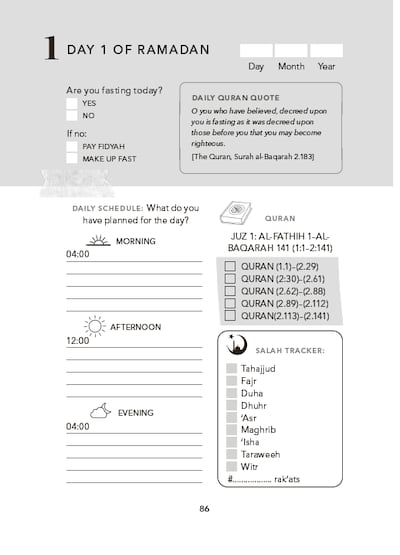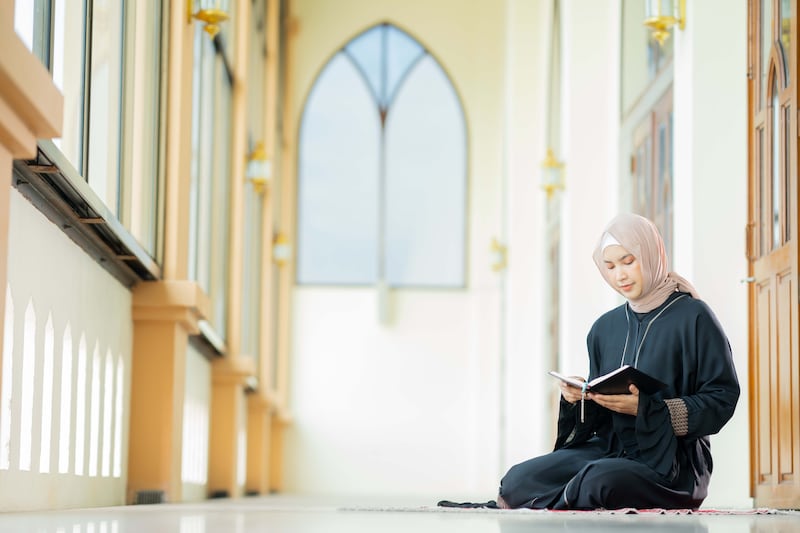Ramadan is rooted in spirituality, gratitude and mindfulness. However, mental well-being can sometimes become an afterthought as those observing the holy month focus their efforts on fasting, religious practices and hosting or socialising with friends and family more often than usual.
This can lead to a sense of feeling overwhelmed and exhausted by the middle of Ramadan, and can manifest as increased fatigue, oversleeping and sluggishness during waking and work hours, as well as a dip in motivation to wake up for suhoor, perform prayers or make an effort with loved ones.
Here are some ways to channel the spirit of the holy month.
Choose quality over quantity
Spiritual mindset coaching duo Zahra Aljabri and her husband James Faghmous say many feel overwhelmed “before Ramadan even begins, because we put so many unrealistic expectations on ourselves, but we are self-sabotaging by worrying about not 'capitalising' on Ramadan”.
Aljabri advises reframing Ramadan as a 30-day “boot camp for the rest of the year, instead of a one-month sprint”, and says people should focus on the quality, rather than quantity, of the spiritual and social rituals we adhere to – be that reading the Quran, attending night prayers at a mosque or gathering with loved ones for suhoor.
No replacement for healthy eating

When it comes to eating during Ramadan, Faghmous’s motto is: fast, don’t feast. He points out that many observers don’t reduce their food intake at all, and instead overcompensate by feasting on heavy meals in the evening. However, light iftars are essential for conserving energy to pray at night and sleep well, adds Faghmous.
“Overeating means you will be sluggish during the night prayer, or miss it altogether, while also hurting your sleep and recovery,” he says, referencing a hadith of the Prophet Mohammed. “He gave us the best nutritional advice – to allocate the space in our stomach with one third food, one third water and one third air.”
A balanced social life
Overeating is often a result of lavish iftars and suhoors, which have become common in parts of the Middle East. However, an increase in socialising can also lead to a feeling of being overwhelmed, explains Dr Linda Sakr, a holistic psychologist and the founder of Keyani Wellness.
“Ramadan is a social month – family and friends gather regularly to break their fast together. But people who are not accustomed to socialising much may find it challenging to keep up with everything,” she says, adding that mental well-being concerns including irritability, moodiness and fatigue are often exacerbated during this month.
Sakr advises clients to create healthy boundaries and identify their priorities when managing their social schedules during the holy month.
Lavish soirees and eating out at Ramadan tents also often call for formal attire, which can add another dimension of stress. Commercialisation has led to many brands creating dedicated, glamorous and steeply priced “Ramadan collections”, yet many observers would rather prioritise comfort and practicality. Travel website TheRoamins analysed Pinterest data and found that in the lead-up to Ramadan, searches for “simple outfits” increased by 151 per cent.
“Be selective with how you spend your time during Ramadan,” says Sakr. “Sometimes a ‘yes’ to someone is a ‘no’ to yourself.”
Aljabri adds that not all social activities drain a person's energy and connecting with loved ones can actually help to reduce stress and anxiety. “But we must ask ourselves why we are doing them. If it is for clout or social status, that could lead to exhaustion and disappointment,” she says. “It’s important to choose social activities that rejuvenate you.”
Staying present and mindful

Self-care is essential to avoid lassitude, and incorporating activities such as exercise and journaling can minimise the risk and help you to connect with yourself.
“Journaling takes us away from the fast-paced nature of our minds and grounds us in the present,” says Aliyah Umm Raiyaan, author of Ramadan Reflections (2023), a guided journal that aims to boost spirituality through inspiring reflections, powerful quotes and practical exercises.
Most Muslim mental health experts also emphasise the importance of “being present” during Ramadan, and remind observers to avoid worldly distractions, focus on worship and meditate on our deeper purpose.
As Faghmous puts it, people should “enjoy the fragrance of Ramadan and revel in the beauty of the Quran without the need to ‘conquer’ it. We can get closer to Allah by just being present. One mindful prayer is more powerful than 20 mindless ones.”
While the coming weeks require Muslims to find their own healthy balance between engaging with community and nurturing their individual selves, Faghmous urges observers to think about how they’d like to improve in the long run. “A powerful question to ask is: ‘Who do I want to become once Ramadan is over?’ Then, work to adopt sustainable habits that you can continue throughout the year,” he says.
Umm Raiyaan echoes this in Ramadan Reflections, while guiding readers to heal and learn from their past. “There is this sense of starting anew post Ramadan,” she says. “And in order to 'wear new skins', we must shed the 'old' that is no longer useful to the person we wish to become.”






